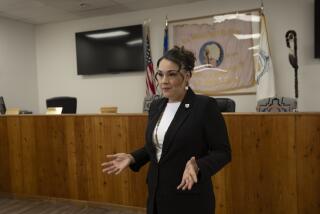Tribe Could Grow Along With Casino : Gambling: The Mashantucket Pequot Indians opened the Foxwoods High Stakes Bingo and Casino in Ledyard, Conn., in 1992. Since then, Pequots have been popping up all over to claim their share.
PROVIDENCE, R.I. â Suddenly, there are a lot more Narragansett Indians--and not because of more babies or fewer deaths, or because new aboriginal villages have been discovered in the wilds of Rhode Island.
The reason: Since the tribe announced plans to open a casino that could produce hundreds of millions of dollars annually, would-be Narragansetts have come out of the woodwork.
âI wouldnât say weâre inundated, but we are seeing more come forward,â said Ella Sekatau, the tribeâs medicine woman and genealogist.
âSome are definitely not Narragansett, but weâll have to expect some liars and cheats when weâre living in a country where God is green.â
Itâs something the Mashantucket Pequot Indians have learned already. Since 1992, when the tribe opened its Foxwoods High Stakes Bingo and Casino in Ledyard, Conn., Pequots have been popping up all over.
âWe get about eight to 10 people a week coming in here saying they think theyâve got some Indian blood in them,â said Joey Carter, a Pequot. âSome of them arenât even close. Everybody wants a piece of the pie. Weâre the rich little Indians.â
The Foxwoods casino was expected to take in $800 million in 1994. And in 1995, Connecticut officials expect revenues to hit $1 billion.
There are only about 300 Pequots--50 to 75 previously unknown members have been located since the casino opened--and each gets a portion of the take.
The amount of the share depends on the size of a family and the age of the Indian. For instance, tribal elders get an increased share, according to a distribution plan filed with the federal Indian Gaming Commission.
Carter, who is married with three boys and a baby on the way, said his share for 1994 would be between $85,000 and $160,000, depending on actual casino profits. Thatâs on top of his salary for working at the casino--something every Pequot must do to qualify for a share--and his wifeâs income.
âThe real millionaires will be the children, who get their share every year from birth and will have quite a lot built up by the time theyâre 21,â Carter said.
Carter said heâs gotten calls from people as far away as England. Women have called inquiring about eligible Indian men. Theyâve even asked about the consequences of getting pregnant on the reservation, he said.
âThey call the unmarried men âThe Elite Few,â â Carter said. âWe have to tell them to watch out, especially the ones coming of age. There are people out there who would do things for money.â
Under tribal rules, applicants may be accepted only if they have at least one-sixteenth Pequot blood and are descended from one of five sisters who lived on the 200-acre reservation around 1900--the last pure-blood Pequots.
The Narragansetts also go back about 100 years to define themselves.
When English colonist Roger Williams came to Rhode Island in 1636, there were about 100,000 Narragansetts, the largest tribe in southern New England. Disease, war and other factors reduced that number.
All existing Narragansetts trace their heritage to a list of 324 people living on the tribeâs Charlestown reservation in 1881. The list was created by the stateâs General Assembly, which decided in 1880 to put up for sale all but two acres of the reservation and pay those living on the land $5,000.
The plan was to eliminate the Narragansetts as a nation. Instead, it may have ensured their survival.
âTo be a tribal member, you must trace your ancestors to that list,â Narragansett first tribal member Matthew Williams said.
Even in 1881, most Narragansetts werenât full-blooded. Many had married whites or blacks and, over time, their ancestorsâ Indian blood has thinned.
âThey labeled us black, mulatto, coppers, Negroes, anything that would further the goal of genocide,â said Sekatau, the medicine woman.
Flash forward more than a century, and hear developer Donald Trump complain to Congress about the special advantages given to Indian-operated casinos like Foxwoods. He points out that its operators are far from full-blooded.
But federal officials say that isnât their concern.
âWe donât look at whether tribe members descend from full-blooded Indians,â said Holly Reckord of the Bureau of Indian Affairs.
Though the Narragansetts have converted to Christianity and lost much of their culture, they remain a political unit as defined by the federal government. Every year, a Thanksgiving festival is held on the tribal land. The tribe also has a council of leaders and a church.
Dr. Lathel Duffield, chief of the bureauâs Tribal Enrollment Branch, said many people make the mistake of believing todayâs Indians should look and act like Indians of old.
âHow could Indians remain aboriginal in a modern world?â he asked.
More to Read
Sign up for Essential California
The most important California stories and recommendations in your inbox every morning.
You may occasionally receive promotional content from the Los Angeles Times.










